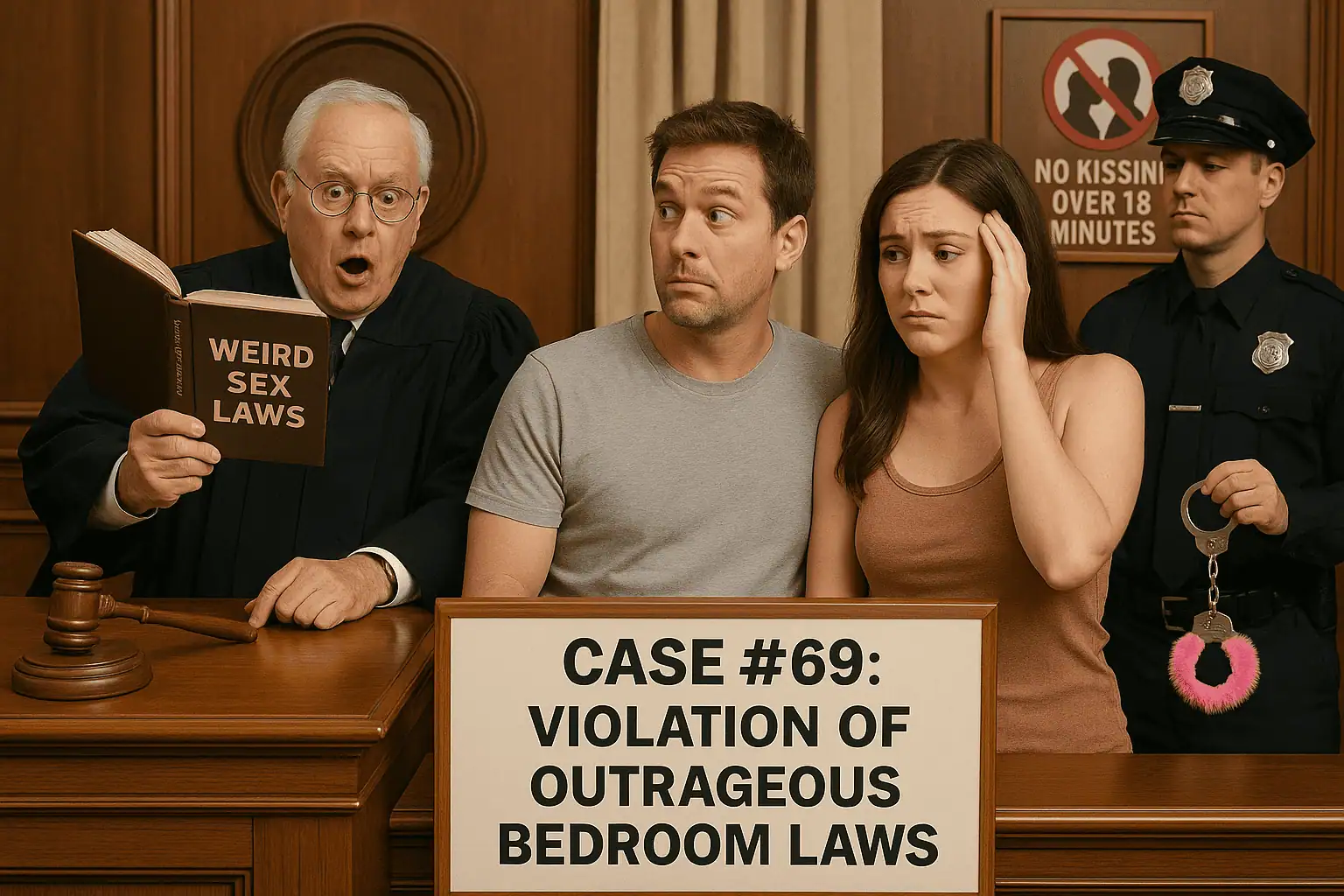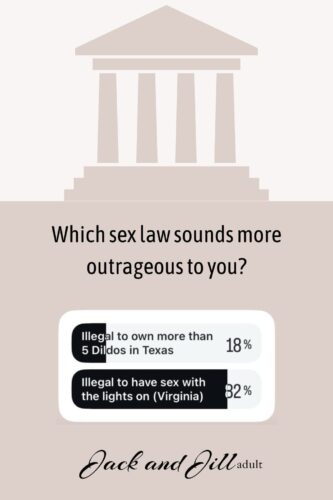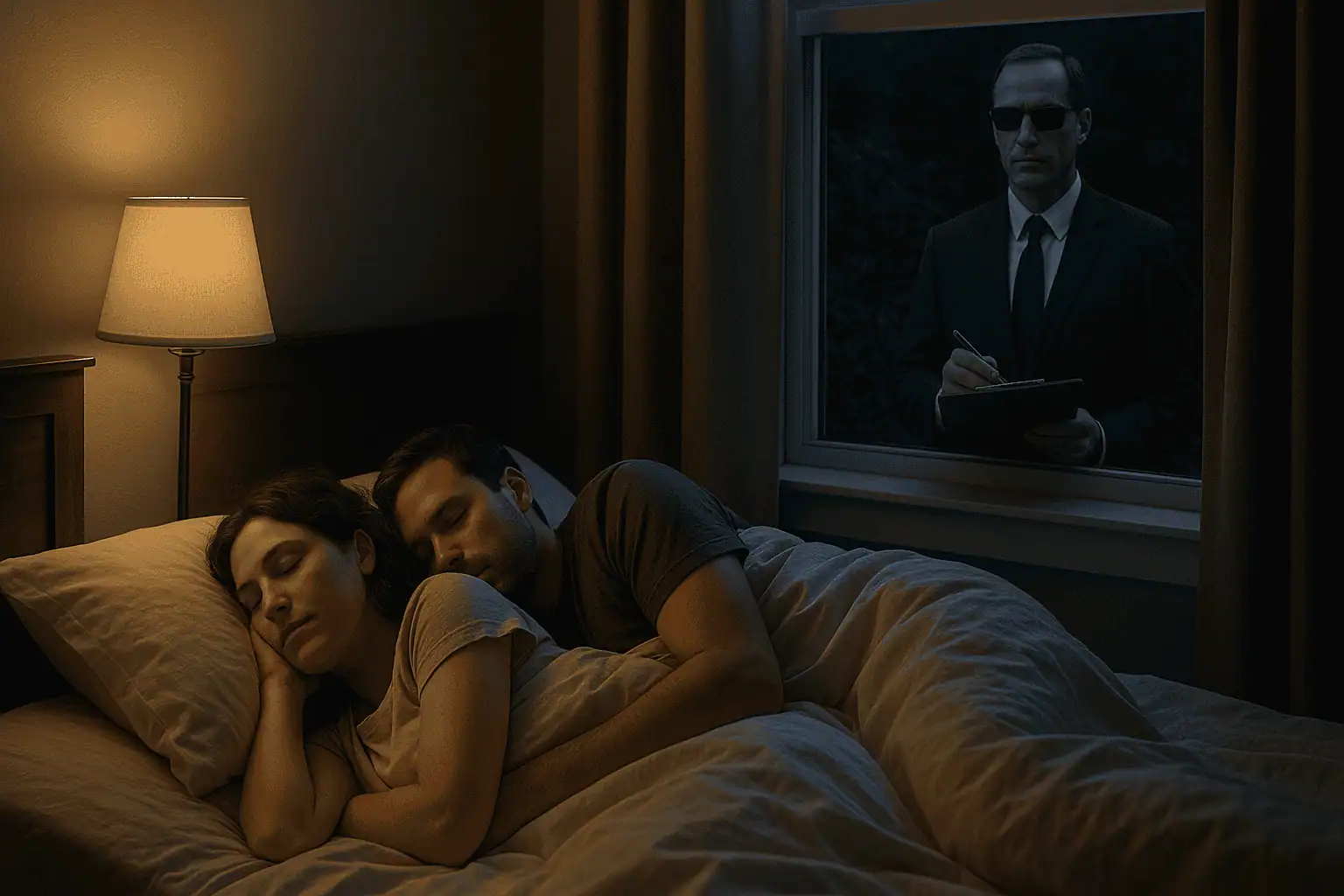
Outrageous Sex Laws: The Strangest Adult Regulations in the U.S.
Have you ever wondered what Outrageous sex laws are lurking on the books across American states? Many of these outrageous sex laws sound like urban legends – yet they’re real statutes, often enacted years ago and technically still enforceable today.
Let’s take a wild tour through bizarre, old-fashioned, and downright ridiculous laws in the United States governing sexual conduct and behavior. From bans on oral sex and bizarre costume rules to restrictions on sex toys and even fishy intimacies, you’ll be equal parts amused and amazed at what’s illegal in various states. (Even the Supreme Court has weighed in on some of these!)
Outrageous Sex Laws and Blue Laws: A Brief Introduction
Think the government has no say in your bedroom? Think again. America’s patchwork of sex laws – many passed decades upon decades ago – reveal a peculiar obsession with regulating sexual relations. Long before modern views on privacy, states eagerly criminalized sexual activity between consenting adults under certain conditions.
Most people aren’t aware these relic decrees persist, often unenforced but still on the books. Why haven’t they been repealed? While federal law and court decisions have invalidated many such provisions, the texts remain, giving us a glimpse into our prudish (and sometimes absurd) legal past (and possibly our future). So buckle up (but not too tightly – that might be illegal somewhere) and prepare for some seriously strange laws about sex that will leave you asking, “They outlawed what?!”
No Lovin’ Without a License: Fornication and Adultery Laws
Believe it or not, in several states, having private sexual intercourse with your significant other could once land you in criminal charges if you weren’t married. Unmarried couples sharing a bed? Scandalous! Georgia, for example, long had a statute decreeing “intercourse between unmarried couples is illegal,” making cohabitation a misdemeanor.
Laws in the United States – known as fornication laws – date back to colonial morality codes. North Carolina was years ago one of at least five states that still outlawed an unmarried man and woman “lewdly and lasciviously” cohabiting. These statutes were rarely enforced (imagine police bursting into bedrooms to check marriage certificates!) but they lingered.
Virginia kept a ban on unmarried sex, known as fornication, until just a few years ago. Lawmakers finally repealed it in 2021, even though it had been on the books since the 1800s. Clearly, many lawmakers over a hundred years ago believed Cupid needed a marriage license to avoid becoming a crime.
[Which Sex Law Sounds Most Outrageous to You Infographic]
We conducted a poll on our Instagram to see which sex laws sound the most outrageous. The verdict?

Adultery, Indecency, and Outrageous Sex Laws
Adultery – extramarital sex – is another private act deemed a crime in surprisingly many states. As of a few years ago, 18 states still considered adultery a criminal offense. Penalties range from small fines to serious jail time.
Idaho, for instance, technically allows up to three years in prison for an adulterer. (Luckily, such ordinances are rarely enforced, typically invoked only in bitter divorce battles.) While most people would agree cheating is immoral, it’s startling to see it on the law books.
The same goes for “live in sin” laws: Mississippi, South Carolina, Utah, and others at one time made all forms of non-marital sex flatly illegal– talk about ridiculous laws by today’s standards! It seems the only hanky-panky that was perfectly legal historically was between husband and wife.
In 18 states, it’s technically illegal for a man to let his erection show through his clothes. Imagine getting a ticket for “excessive enthusiasm in public”—talk about a hard law to follow!

“Seduction” Felonies Aimed at Protecting Women’s Virtue
One of the most archaic laws still lingering is a class of weird sex laws aimed at protecting young women’s chastity. In Michigan, for example, there is an outrageous sex law from 1931 that makes it a felony to “seduce and debauch” an unmarried woman. Yes, you read that right – if a man sweet-talks a single lady into bed with no intention of marrying her, he’s guilty of a felony. If found guilty, the seducer faces up to five years in state prison. Lawyers have even occasionally invoked it as a sneaky defense, pleading their male client guilty of “seduction” as a lesser offense to dodge harsher charges. Talk about lawful gymnastics!
Michigan’s not alone: South Carolina has a similar statute against “seduction under promise of marriage,” making it a misdemeanor for a man to falsely promise to marry a woman as a way to seduce. That’s right – South Carolina will punish your false romantic promises with up to a year in jail. Lawmakers once wrote these statutes to guard a woman’s honor, but today they just seem like quaint oddities. They ignore the woman’s agency and assume the male partner deceived her.
The irony is that such statutes were meant to protect women’s virtue, but they also enshrined some deeply sexist ideas about gender roles. Thankfully, in an age of dating apps, casual relationships, and vibrators, prosecutors have zero interest in enforcing these museum-piece laws. But they remain an entertaining reminder of how different states tried to play chaperone to courting couples years ago.
Sodomy Laws: Bans on Oral Sex, Anal Sex, and “Unnatural” Acts
Perhaps the most notorious category of outrageous sex laws are the sodomy statutes – those banning “unnatural” sexual acts (which usually meant any sex that wasn’t between a married man and woman in the missionary position).
For generations, many states outlawed oral sex and anal sex under these broad laws known as sodomy laws. In fact, as recently as the early 2000s, 14 states still had the regulations on the books. These laws often used colorful language to proscribe “the abominable and detestable crime against nature.” Florida law makes it a misdemeanor to commit any “unnatural and lascivious act,” which officials have interpreted to include non-reproductive sex acts. In other words, Florida law could treat oral sex as sodomy and call it illegal—clearly out of step with modern life. This is the same state that also bans things like porcupine intimacy, but more on that later.
Outrageous Sex Laws Challenged in the Supreme Court
Some states targeted same-sex relations specifically. Texas famously had a statute criminalizing “homosexual conduct,” defined as any “deviate sexual intercourse” (meaning oral or anal contact) between members of the same sex. This was the very law at issue in Lawrence v. Texas (2003), the landmark Supreme Court case that struck down sodomy bans. The U.S. Supreme Court’s decision in Lawrence invalidated all state laws as applied to sodmy for consenting adults, asserting a constitutional right to private adult intimacy. But Many states still have laws against sodomy on the books despite a Supreme Court ruling against them in 2003.
Yet – incredibly – many of these regulations remain in the text of state codes. South Carolina still defines “buggery” (anal intercourse) as a felony punishable by five years in prison. Michigan technically makes “the infamous crime against nature” (with mankind or beast) a felony, and has a separate ban on “gross indecency” covering any oral or anal activity regardless of gender. Massachusetts still outlaws “unnatural and lascivious acts,” with up to 5 years imprisonment, – language so vague it could encompass a wide range of private behavior. And Virginia (until it was forced to update by court rulings) had a “crimes against nature” law as well, forbidding all oral or anal sex – whether gay or straight, married or not.
Legal Zombies and Lingering Fears
It’s important to note that while these outrageous sex laws are on the books, they cannot be executed after Lawrence v. Texas. They’re like legal zombies – officially dead, but shambling along in print. However, with shifting winds in the judiciary, some have expressed concern: when the Supreme Court overturned Roe v. Wade in 2022, one Justice mused that the Court should also reconsider the Lawrence decision.
People worry that officials could revive these old bans on “sexual acts” like oral sex or certain sexual positions. For now, you don’t risk arrest for private intimacy in the U.S.—but the fact that these laws still exist on the books remains a strange quirk of American law. They serve as a reminder of a time not so long ago (about 20 years) when the law had its nose firmly in the bedroom.

Wild and Crazy Coupling: Bans on Specific Positions and Acts
If you thought generic rules against sodomy were odd, wait until you hear about the ultra-specific sexy-time restrictions some locales cooked up.
How about a law against turning the lights on? It sounds like a dirty joke, but old rumor holds that in Virginia, it is illegal to engage in sexual activity with the lights on. This oft-cited weird law (likely never implemented and possibly apocryphal) insisted that love should only be made in the dark, as if a lit lamp transformed consensual lovemaking into an offense.
Lights Out and Missionary Only: Odd Bedroom Laws
And if you like creative positions, be careful. Washington, D.C. supposedly once banned any sex position except missionary. The nation’s capital allegedly did not want anyone to get too adventurous in bed. Doggy style or cowgirl was illegal by that story.
You have to wonder how anyone could execute such a law. Would a police officer peek in to check your position? That sounds more like a voyeur exhibitionist fantasy than actual enforcement. Many weird sex laws end up as urban myths, but they last in trivia because they show how absurd government overreach can get.
Even More Outrageous Sex Laws: Guns, Beer, and Pet Permits
Speaking of absurd, one Wisconsin city supposedly regulated firearms in the bedroom – and not in the way you’d think. In Connorsville, Wisconsin, a local ordinance allegedly makes it illegal for a man to fire a gun while his female partner is having an orgasm.
It’s hard to say what inspired this very specific ban on coital gunfire – perhaps a literal interpretation of “going out with a bang”? The mental image of someone discharging a rifle at the critical moment is both comical and horrifying. True or not, this tale of a law is often cited in “outrageous sex laws” lists and never fails to get a laugh.
Another tidbit from the law-that-sounds-like-a-punchline department: In Ames, Iowa, husbands are legally limited to three gulps of beer while in bed with their wives. Why? Maybe to prevent intoxicated misperformance? – but it’s on record as one of those wacky regulations that might still technically be town law.
The Legacy of Absurd Sex Laws
From lights-off mandates to guns-at-orgasm bans, these laws straddle the line between truth and myth. Even when they were on the books, these rules were almost never enforced – they were too silly, even years ago, for any serious prosecution. Yet they hold a special place in our cultural imagination, symbolizing the extreme lengths to which officials have gone to legislate morality (or just showcase local eccentricity). The next time you flip on the bedroom light or crack open a beer in bed, be grateful you’re not breaking the law – well, at least not anymore!
When Law Gets Fishy (and Porcupine-Prickly)
Hold on to your zoology textbooks, because some American sex laws wander into the animal kingdom in truly bizarre ways. It’s no surprise that sex with animals (bestiality) is illegal – that’s standard. But the specifics of some statutes will leave you scratching your head (and clutching your pet tight).
Case in point: Minnesota. The Land of 10,000 Lakes apparently once felt it necessary to spell out a certain boundary: it is illegal for any man to have sex with a live fish. Yes, fish. Alive. The Minnesota rule books years ago decided that was a bridge too far. Curiously, the statute doesn’t seem to explicitly forbid getting frisky with a dead fish. This odd omission has given rise to many jokes – so a cold dead fish is OK, Minnesota?
The existence of this law suggests there may have been at least one instance of some fellow getting overly friendly with a trout. It’s both gross and amusing, and it definitely lands on every list of weird sex laws that people won’t believe actually exist.
Porcupine Problems: Florida’s Sharp Lesson
Minnesota isn’t alone in banning piscine love. Florida infamously has a statute against sexual relations with porcupines. That sounds like a joke (“the only state where porcupine sex is explicitly illegal is Florida”). In fact, a news story from 2009 reports that two Russian tourists in Florida read about the porcupine law – and then tried to challenge it in the worst way. These men actually went out, found a porcupine, and engaged in… The result? A lot of pain and a trip to the hospital with needles in a very sensitive area. They fled Florida before they could face charges, but Mother Nature had delivered some punishment. It’s a shocking example of an outrageous law leading to an even more outrageous attempt to break it! Florida’s law now holds a permanent place in weird law lore thanks to that porcupine tale.
When Laws Go Full Circus: Horses, Clowns, and Ambulances
Laws about animals sometimes get oddly specific. In Massachusetts, there’s supposedly a regulation against having sex with a rodeo clown in front of horses. The rule says you cannot consummate your love with a rodeo clown while horses are around. Maybe lawmakers thought it might scare the horses. Imagine the poor stallion witnessing that scene! Fox News once reported this as a real law. It probably came from a real event long ago, even if that sounds unbelievable. It is so specific you have to wonder what prompted it. Did a stable tryst end with a stampede? Either way, it stands out as one of the most outrageous sex regulations people talk about.
And if that sounds niche, Tremonton, Utah, supposedly has a rule that says a woman cannot have sex with a man in an ambulance. If she does, the law allows the female to be charged and even have her name published in the local newspaper as punishment. That’s insult on top of injury! This local law targets a specific kind of indecency and unfairly singles out the female. The law is almost never enforced, but its existence still boggles the mind.

Obscene Devices and “Immoral” Merchandise: When States Ban Pleasure
Not all strange sex laws punish acts – some target objects and expressions associated with sex. In parts of the U.S., even adult toys and risqué paraphernalia have been targets of legislation. Perhaps the most infamous example: Texas’s long-standing ban on owning too many dildos. Yes, they figured that no one should legitimately need more than five of a certain battery-operated friend. The state law declares it a crime to possess “six or more obscene devices,” which explicitly includes dildos and similar toys.
In Texas, you can freely stockpile guns and even show them off in public, but the law limits how many vibrators you can own. Many comedians and activists have called out this absurd double standard.
In one memorable protest, “dildo-wielding” demonstrators in Texas waved their verboten Sixth Dildos in the air to highlight the hypocrisy. Although enforcement of this law is virtually nil in modern times (and one would hope police have better things to do than count your bedroom gadgets), it technically remained on the books for years. It’s a prime illustration of how moralistic lawmakers view adult toys as more threatening than firearms – a stance most would find laughable.
Alabama’s Outrageous Sex Laws on Sex Toys
Alabama wasn’t the only state against pleasure products. The state banned the sale of “obscene devices,” which basically meant adult toys were outlawed. For decades, buying a vibrator in Alabama meant skirting the law. Adult stores had to sell them as “novelties” or educational models to get around the ban. The ordinance went to court on privacy grounds, but Alabama fought to keep it.
Even today, Alabama’s code still bans the distribution of devices “useful primarily for the stimulation of human genital organs.” That’s just a long way of saying vibrators. Until recently, adults in Alabama needed a doctor’s note or a lawful excuse to buy a dildo. This highlights the prudish attitude in many Southern state laws. For a long time, selling toys for fucking was bad, but selling guns for killing was fine. Luckily, enforcement is much lighter now, and adult stores operate openly, even if the old laws are still there.
It wasn’t just devices that lawmakers targeted. Information about contraception and sexual health was also restricted in some places. Massachusetts kept a law from 1879 that made it illegal to share birth control information. Breaking it could mean a $1,000 fine or up to three years in jail for printing or handing out pamphlets about contraceptives.
This was basically a state version of the old federal Comstock Act. Even after the Supreme Court struck down contraception bans for married and unmarried people, Massachusetts didn’t bother to remove this law for years. Technically, even a Planned Parenthood flyer about condoms was once illegal in Boston. Most of these censorship regulations are never implemented because federal statute overrides them, but their persistence reminds us that even basic sexual knowledge was once seen as dangerous.
Censorship of BDSM
Some laws cross into the absurd by targeting costumes or revealing outfits. Mississippi, eager to force “decency,” actually outlawed S&M themed entertainment. The state’s obscenity statutes defined “sadomasochistic abuse” as any depiction of flagellation or torture involving a nude person, someone in undergarments, or anyone in a revealing or bizarre costume.
This complex legalise language banned any explicit BDSM imagery, like bondage, whips, or fetish outfits, as automatically obscene. The phrase “bizarre or revealing costume” paints a vivid picture—a latex dominatrix outfit or a leather harness was beyond the pale. In Mississippi, producing or selling media that showed someone in a sexy leather get-up getting spanked was illegal. This was part of obscenity law, not a direct ban on conduct, but it shows how deep prudery ran. Even years ago, state officials worried that someone might enjoy a video of consensual kink, so they made it a crime. Now, as society changes, these rules seem outdated. Still, they remain a real part of Southern history, even if they make modern people shake their heads.
Costumes, Cleavage, and Cross-Dressing: Policing Attire
Decency laws have tried to control how people dress in public. Cleveland, Ohio once banned women from wearing low-cut tops. The city code specifically prohibited showing too much cleavage unless it was covered by something fully opaque. If a woman’s shirt was a little too revealing, she could technically be breaking the law.
In Arizona, one old ordinance (repealed in the 21st century) made it illegal for ladies to wear pants in Tucson. This rule came from a time when cross-dressing or a woman in “men’s attire” was seen as immoral. Such laws didn’t target sex acts directly, but they show how lawmakers wanted to implement modesty and traditional gender roles.
Parachuting Skirts, Flirting, and Pillow Talk: The War on Expression
Florida once had a quirky rule that banned “bizarre or revealing” costumes at certain times. One statute made it illegal for an unmarried woman to parachute on Sundays, especially if she wore a short skirt—presumably to prevent her from flashing the crowd below. This was an actual Florida law: an unmarried woman who parachuted on Sunday could face a fine or even arrest. The law’s wording didn’t mention clothing, but people retold it with the image of a dress blowing up mid-jump. The law applies to unmarried females for unclear reasons. Florida never explained why, and people wisely ignore it today.
And let’s not forget the war on flirtation and dirty talk. In Haddon Township, New Jersey, it’s illegal to flirt – the town ordinance forbids a person from accosting someone of the opposite sex in public and making unwanted advances, as a way to curb sexual harassment. Noble intent, perhaps, but the wording is so broad it effectively bans harmless flirting too, making it a punishable offense.
In far-off Oregon, the quaint town of Willowdale reportedly banned cursing and dirty talk during sex. One law even claims a husband can’t whisper anything sultry into his wife’s ear during intercourse. In Willowdale, you risk breaking the law if your pillow talk gets too spicy—only G-rated moans allowed! This probably never existed in any real, enforceable way, but just imagining lawmakers trying to control bedroom whispers feels absurd. Some places really took prudishness to the extreme, treating even private moments of passion as matters for public concern.
Outrageous Sex Laws: Forced Morality vs. Modern Reality
As we’ve toured these outrageous laws, a pattern emerges: many were products of their time, reflecting social mores years ago that simply don’t fit today’s world. They often targeted anything seen as “deviant” or “excessive” in sexual behavior, trying to “protect” society from moral decay. Yet reading them now, one can’t help but chuckle or shake one’s head. They range from the weird and silly to the oppressive and sexist.
Fortunately, most of these laws have been rendered toothless by modern court decisions or simply fallen out of enforcement. The Supreme Court decisions on privacy (from Griswold to Lawrence) have nullified many of the broad bans. Evolving social attitudes have made it politically untenable to prosecute someone for consensual adult acts or for owning a vibrator or wearing pants.
That said, it’s striking that current laws in some states still retain this language. It’s a reminder that change sometimes skips a spot – legislatures may not bother to repeal a ludicrous statute until someone actually points it out. So they sit there, relics in the code, giving us insight into the fears and values of yesteryear.
They also provide endless fodder for jokesters, trivia buffs, and educators who use them to spark discussion on history and sexual politics. Teachers and students alike find them a humorous entrée into discussing why statutes exist and how society evolves.
Joke or Danger?
Which states have the craziest sex laws? Florida gave us the porcupine story. Minnesota is famous for the fish caper. Texas and Alabama went after adult toys. Georgia and North Carolina made it illegal to live together outside marriage. Mississippi banned BDSM acts. Utah outlawed sex in ambulances. Michigan and South Carolina implemented “chivalrous” seduction punishments. Many more states have strange laws like these.
Nearly every region has something to add to the list of odd sex laws in the U.S. South Dakota once required hotel beds be two feet apart to stop couples from getting frisky on the floor. Rhode Island fined lovers just $10 for extramarital sex. The list goes on. Idaho reportedly banned kissing that lasted more than 18 minutes. You would need a timer for make-out sessions there!
Most of these laws are curiosities, not real threats. They survive as jokes, bits of folklore, or sometimes as tools in divorce cases. Sadly, anti-sodomy statutes targeted LGBTQ people for years. Maybe someday lawmakers will clean them all out. Until then, they offer comic relief and show the gap between old laws and real life.

Laughing (and Learning) from Legal Oddities
Reading through these strange statutes can be funny, but it also shows how notions of morality have changed. What once prompted panic – oral sex, cohabitation, birth control advice, even flirtation – is now normal life for most Americans.
The fact that it was all once outlawed somewhere is a testament to both the puritanical roots of our laws and the progress we’ve made in personal freedom.
From Outrage to Ordinary: How Sex Laws Changed
These outrageous sex laws make us laugh, but they also make us appreciate living in a time when the government (mostly) minds its business about our bedrooms. They attract attention from media, educators, even trivia-loving women and men who share them on social media with disbelief.
As an adult company, we at Jack and Jill Adult know that pleasure is nothing to be ashamed of – and certainly not something to be legislated away. We celebrate how far we’ve come from those days. In some places, it was once illegal to sell an adult toy or for an unmarried couple to simply live together. Now, not only can you shack up without fear, but you can openly shop for whatever brings you joy in the bedroom. (Looking for something to spice up your own private life? Check out our collection of sex toys and costumes – completely legal! We also offer sexual wellness products to help everyone enjoy intimacy safely and comfortably.)

